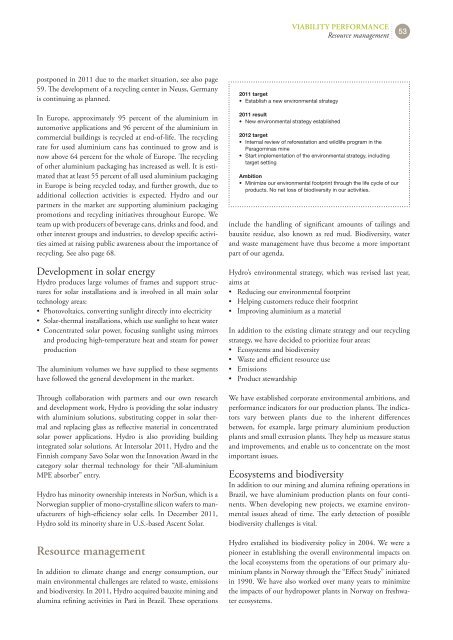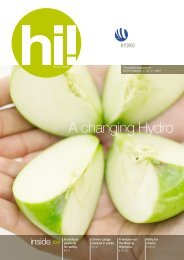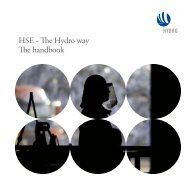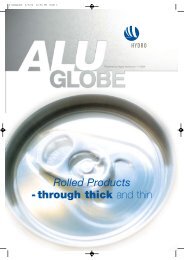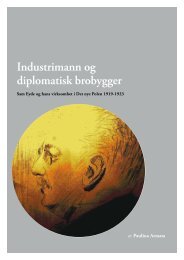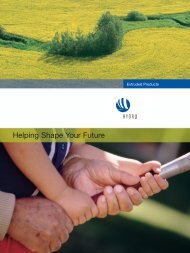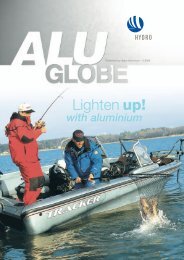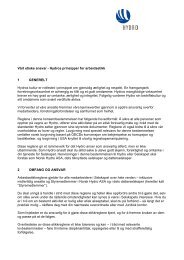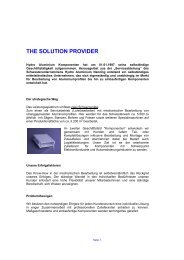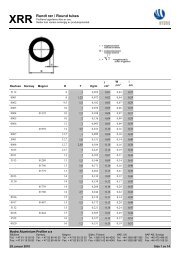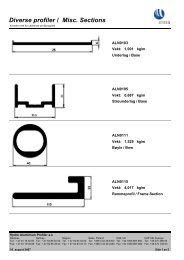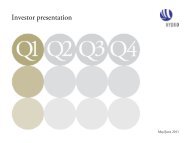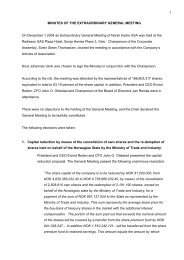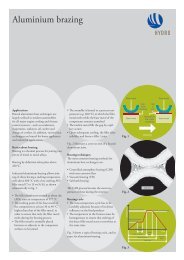Hydro Annual Report 2011b
Hydro Annual Report 2011b
Hydro Annual Report 2011b
You also want an ePaper? Increase the reach of your titles
YUMPU automatically turns print PDFs into web optimized ePapers that Google loves.
postponed in 2011 due to the market situation, see also page<br />
59. The development of a recycling center in Neuss, Germany<br />
is continuing as planned.<br />
In Europe, approximately 95 percent of the aluminium in<br />
automotive applications and 96 percent of the aluminium in<br />
commercial buildings is recycled at end-of-life. The recycling<br />
rate for used aluminium cans has continued to grow and is<br />
now above 64 percent for the whole of Europe. The recycling<br />
of other aluminium packaging has increased as well. It is estimated<br />
that at least 55 percent of all used aluminium packaging<br />
in Europe is being recycled today, and further growth, due to<br />
additional collection activities is expected. <strong>Hydro</strong> and our<br />
partners in the market are supporting aluminium packaging<br />
promotions and recycling initiatives throughout Europe. We<br />
team up with producers of beverage cans, drinks and food, and<br />
other interest groups and industries, to develop specific activities<br />
aimed at raising public awareness about the importance of<br />
recycling. See also page 68.<br />
Development in solar energy<br />
<strong>Hydro</strong> produces large volumes of frames and support structures<br />
for solar installations and is involved in all main solar<br />
technology areas:<br />
• Photovoltaics, converting sunlight directly into electricity<br />
• Solar-thermal installations, which use sunlight to heat water<br />
• Concentrated solar power, focusing sunlight using mirrors<br />
and producing high-temperature heat and steam for power<br />
production<br />
The aluminium volumes we have supplied to these segments<br />
have followed the general development in the market.<br />
Through collaboration with partners and our own research<br />
and development work, <strong>Hydro</strong> is providing the solar industry<br />
with aluminium solutions, substituting copper in solar thermal<br />
and replacing glass as reflective material in concentrated<br />
solar power applications. <strong>Hydro</strong> is also providing building<br />
integrated solar solutions. At Intersolar 2011, <strong>Hydro</strong> and the<br />
finnish company Savo Solar won the Innovation Award in the<br />
category solar thermal technology for their “All-aluminium<br />
MPE absorber” entry.<br />
<strong>Hydro</strong> has minority ownership interests in NorSun, which is a<br />
Norwegian supplier of mono-crystalline silicon wafers to manufacturers<br />
of high-efficiency solar cells. In December 2011,<br />
<strong>Hydro</strong> sold its minority share in U.S.-based Ascent Solar.<br />
resource management<br />
In addition to climate change and energy consumption, our<br />
main environmental challenges are related to waste, emissions<br />
and biodiversity. In 2011, <strong>Hydro</strong> acquired bauxite mining and<br />
alumina refining activities in Pará in Brazil. These operations<br />
2011 target<br />
• Establish a new environmental strategy<br />
vIABIlItY perForMAnCe<br />
Resource management<br />
2011 result<br />
• New environmental strategy established<br />
2012 target<br />
• Internal review of reforestation and wildlife program in the<br />
Paragominas mine<br />
• Start implementation of the environmental strategy, including<br />
target setting<br />
Ambition<br />
• Minimize our environmental footprint through the life cycle of our<br />
products. No net loss of biodiversity in our activities.<br />
53<br />
include the handling of significant amounts of tailings and<br />
bauxite residue, also known as red mud. Biodiversity, water<br />
and waste management have thus become a more important<br />
part of our agenda.<br />
<strong>Hydro</strong>’s environmental strategy, which was revised last year,<br />
aims at<br />
• Reducing our environmental footprint<br />
• Helping customers reduce their footprint<br />
• Improving aluminium as a material<br />
In addition to the existing climate strategy and our recycling<br />
strategy, we have decided to prioritize four areas:<br />
• Ecosystems and biodiversity<br />
• Waste and efficient resource use<br />
• Emissions<br />
• Product stewardship<br />
We have established corporate environmental ambitions, and<br />
performance indicators for our production plants. The indicators<br />
vary between plants due to the inherent differences<br />
between, for example, large primary aluminium production<br />
plants and small extrusion plants. They help us measure status<br />
and improvements, and enable us to concentrate on the most<br />
important issues.<br />
Ecosystems and biodiversity<br />
In addition to our mining and alumina refining operations in<br />
Brazil, we have aluminium production plants on four continents.<br />
When developing new projects, we examine environmental<br />
issues ahead of time. The early detection of possible<br />
biodiversity challenges is vital.<br />
<strong>Hydro</strong> estalished its biodiversity policy in 2004. We were a<br />
pioneer in establishing the overall environmental impacts on<br />
the local ecosystems from the operations of our primary aluminium<br />
plants in Norway through the “Effect Study” initiated<br />
in 1990. We have also worked over many years to minimize<br />
the impacts of our hydropower plants in Norway on freshwater<br />
ecosystems.


